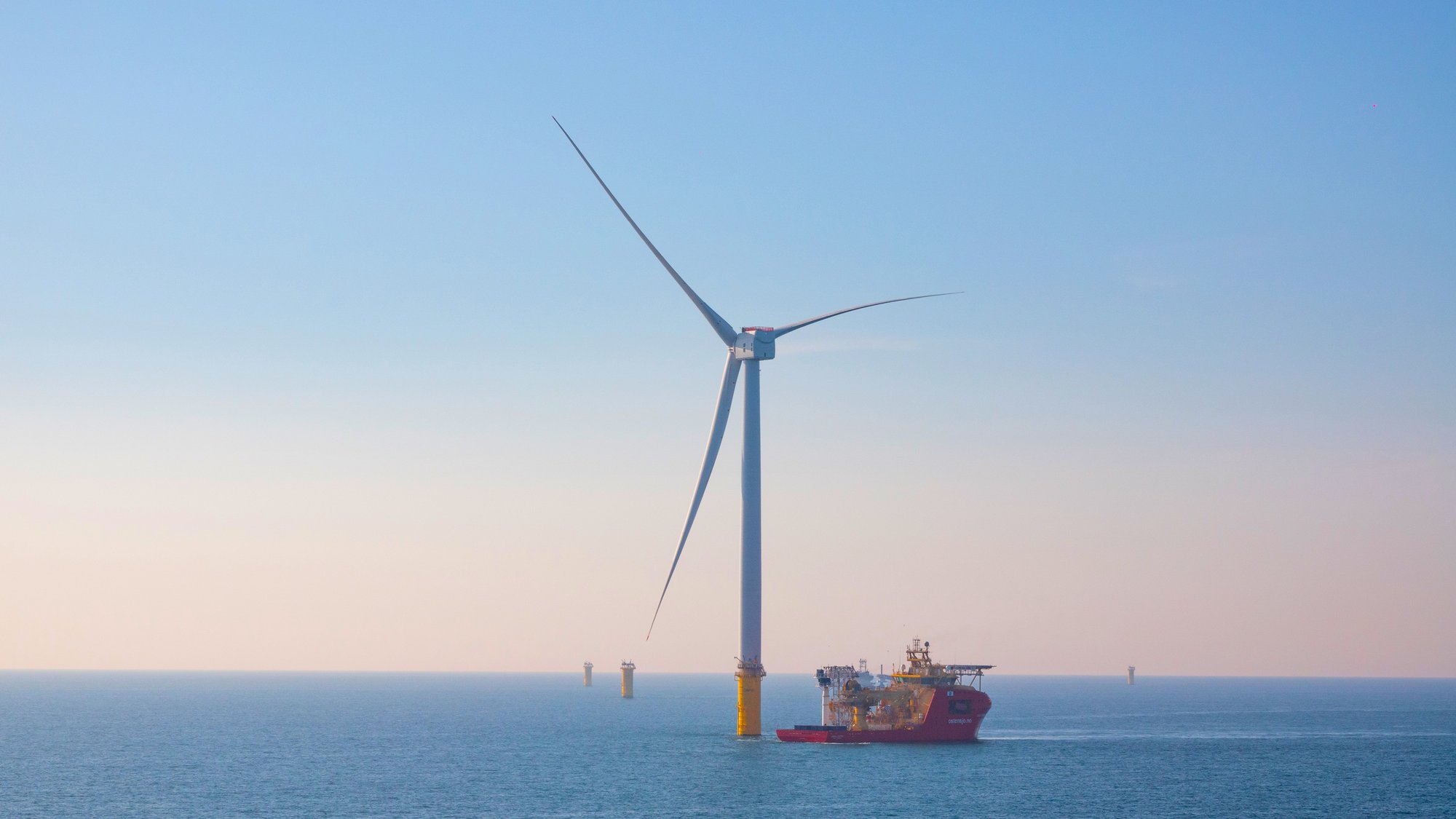Equinor

The company
Equinor is an international energy company headquartered in Norway. With 22,000 employees in nearly 30 countries, their ambition is to be a leading company in the transition to sustainable energy. With over 50 years of solving challenges in the North Sea, they are the largest supplier of energy to Europe and a pioneer in renewables and low carbon solutions.
Equinor, along with partners SSE Renewables and Vårgrønn, are building Dogger Bank Wind Farm, the world’s biggest offshore wind farm off the North-East coast. They are committed to establishing a strong presence in the local community.
Equinor works with leading local research institutions through the North-East Energy Catalyst’s Integrated Smart Energy Laboratory (ISEL) to support offshore wind industry research and development targeted at key industry challenges.
ISEL brings together existing smart grid capabilities at Durham University, Newcastle University, and the Offshore Renewable Energy Catapult in Blyth. Through their relationship with Newcastle University, they were introduced to the National Innovation Centre for Data.
The problem
The operational complexity of wind farms including the colossal project at Dogger Bank presents a significant challenge. Equinor, operator of the wind farm, require innovative solutions for turbine performance optimisation and maintenance scheduling.
Thibaut Forest, data scientist at Equinor emphasised the need for data-driven insights “We want to answer questions using data from wind turbines. Once the turbine is producing, is it producing as it should? Are you losing some production, are there faults or underperformance that can be discovered?”
Equinor sought the National Innovation Centre for Data’s expertise in data science projects to add value to the project through up-skilling and knowledge transfer.
.png?width=1800&height=900&name=Article%20images%20(11).png)
Left: Tom Nightingale, UK Supply Chain Leader, Equinor. Right: Thibaut Forest, Data Scientist, Equinor.
The goal
Equinor aimed to leverage cutting-edge data science and analytics to develop a system that would enable them to optimise the operation and maintenance of its wind farms, ensuring maximum efficiency and sustainability.
Tom Nightingale, Equinor’s UK Supply Chain Leader reflects on the goal “We want to be the best in the world at operating offshore wind farms. We want to set up our own systems internally that we can use across all our wind farms and Dogger Bank is setting the direction for our future systems infrastructure. The system that the National Innovation Centre for Data have supported us to develop will be a key part of our new O&M model”
Thibaut Forest, data scientist at Equinor who worked on the project added “Working with the National Innovation Centre for Data, I had the opportunity to meet many knowledgeable individuals from academia. It was interesting to pick the brains of the project team on those big topics. We chose to focus on the theoretical production from wind turbines.”
The result
A predictive model was developed with an accuracy, that fulfilled the project's objectives.
Additionally, the skills transfer helped to enrich Equinor's capabilities in model development and deployment for wind generation.
.png?width=1800&height=900&name=Article%20images%20(16).png)
Image credit: Canva
Implementation
The team from the National Innovation Centre for Data led by Dr Jacek Cala, including Dr Jonny Law and Dr Hollie Johnson were tasked with collaborating with Equinor to solve foundational problems with particular focus on theoretical production —a keystone for operations and maintenance optimisation.
This involved a comprehensive data science pipeline from business understanding to model deployment.
Technical insight
The project’s success rested on deploying tree-based machine learning techniques, such as Random Forest and XGboost.
Later, the skills project included supervision of a Masters project which involved building a set of Deep Neural Network models to enhance accuracy. This moved beyond solving the theoretical production problem and facilitated significant skills transfer in data science and engineering, including upskilling in MLOps (Machine Learning Operations) with Databricks and code version control.
.png?width=1800&height=900&name=Article%20images%20(9).png)
Image credit: Canva
Business impact
While the product is not in production currently, Tom says that it is ready to be implemented when the user requirement for the model is necessary, “We have a finished product that can be integrated into our system when it’s needed as we continue to construct the wind farm and become operational. We also now have a model for a positive learning collaboration with NICD and aim to look at future opportunities to work together.”
Thibaut looks at the applications of the product and the impact it could have on the business once the turbines are producing, “Our systems serve a large user base with its comprehensive suite of products. Specifically, planners will find the drag-and-drop feature for organising work orders in their schedules particularly useful. In this context, the primary users are planners.
We also have the use case of looking back when a turbine was stopped. We can analyse the data and answer how much production we have lost. This has benefits for engineers looking at the data to understand what could have been done better; technicians can use it or even plant managers who are interested in the overall loss production on a monthly basis”.
Skills transfer
Thibaut also emphasised that it wasn’t just the delivered model that benefitted the business “We got a model in the end, but we also had two Masters students exploring this topic who benefitted from the experience.
From a research point of view, it’s a really interesting topic. I’d love to do a similar project again with more Masters students. What we learned from the National Innovation Centre for Data was not all about the final product. Some of the main things we got out of this collaboration were up-skilling sessions and training, particularly around managing data projects through frameworks, tools, and methodologies”.
For Equinor, as with many organisations, data science is a new discipline with a magnitude of applications. Tom commented on the up-skilling Thibaut can pass on internally within the company; “The team benefitted in terms of structure around data science projects, and that was thanks to the National Innovation Centre for Data. As well as general and formal learning that you do throughout any project, we were able to pass on skills and expertise learned through the engagement.”
"We have closely worked with a team from the National Innovation Centre for Data on a challenging problem on our offshore wind turbines. Their expertise in data science and project management has accelerated the development of a new machine learning model ready to be implemented on our assets. At the same time our data science team's skills and workflow were improved, which can be further used in other projects internally."
Thibaut Forest, Data Scientist, Equinor
Looking forward
Tom looks forward to future collaborations with NICD; “We have the opportunity to continue our work with the National Innovation Centre for Data on future projects. The experience we had was very positive. We would definitely consider those future projects and continue our engagement.”
Thibaut also expressed the desire to work with the National Innovation Centre for Data again in the future “One of the reasons I'd like to work again with the National Innovation Centre for Data is to access highly skilled people that can support the project. I would also say their collaborative philosophy in trying to help us solve our problem was important and the communication and way of working established, helped us to keep on track”.
"Our ambition for offshore wind is to develop close relationships with communities, supply chain and academia. Discovering the National Innovation Centre for Data so close to our operations base and control room in the North East of England provided an opportunity to combine all three and utilise local skills to support our systems development that will be used on our Dogger Bank wind farm and beyond.
We have had a fantastic experience working with the National Innovation Centre for Data and hope to build on this relationship with future projects."
Tom Nightingale, North East Stakeholder Manager, Equinor
To find out more about Equinor and the development of Dogger Bank Wind Farm, visit their website.
You can read more of our case studies and sign up to our newsletter to keep up to date with our latest news, events and developments.

Our Discovery workshop
Our Discovery workshops enable you to explore the potential of your data and understand the benefit you could gain before committing to a full-scale project.